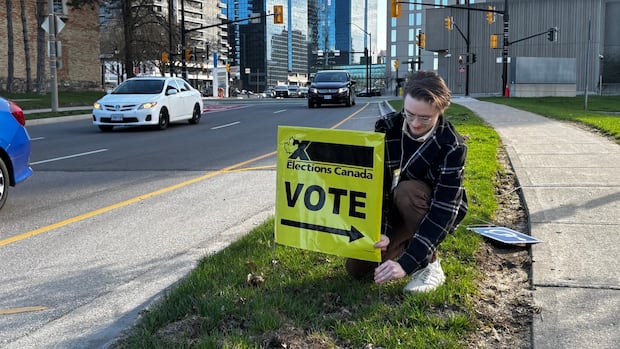
The U.K. government announced Thursday that it will be lowering the voting age from 18 to 16, in time for its next general election. The move is encouraging for advocates who want to see the same change made in Canada.
“It’s a step that should have been done a long time ago,” Jaden Braves, CEO of Young Politicians of Canada, a Toronto-based non-profit, told CBC News.
“I think it’s very unfortunate that Canada could not be a leader within this discussion.”
The U.K.’s move is one of several changes that Deputy Prime Minister Angela Rayner said would “ensure more people have the opportunity to engage in U.K. democracy.”
Jaden Braves, founder and CEO of the Young Politicians of Canada, says it’s ‘infantilizing’ that young Canadians don’t have a say on issues that matter to them. (Catherine Morrison/The Canadian Press)
Advocates say lowering the voting age will ensure young Canadians get engaged in politics earlier and boost voter turnout. But detractors have said in the past that lowering the threshold would have little impact on overall turnout and have suggested there are other avenues for teens to get involved in politics.
Previous efforts largely unsuccessful
There have been several efforts to lower the age in the past at all levels of government, but none have so far come to fruition.
A number of youth advocates launched a legal challenge in 2021, but it is still making its way through the courts.
The group argues that the rule violates two sections of the Charter of Rights and Freedoms: Section 3, which states that “every citizen of Canada” has the right to vote in an election for members of the House of Commons or a legislative assembly; and Section 15, which states that “every individual is equal before and under the law.”
Amelia Penney-Crocker, a youth advocate involved in the court challenge, said she hopes the U.K.’s move will spur Canada to give 16- and 17-year-olds the vote.
“It’s awesome to see a country that obviously has a lot of connection to Canada making this shift, and I think that it bodes really well for Canada,” she told CBC News.
Amelia Penney-Crocker is shown speaking at a climate action rally in Halifax in October 2021. Penney-Crocker is part of a legal challenge looking to lower the voting age to 16. (Amelia Penney-Crocker)
Penney-Crocker was 15 when she first got involved in the court challenge. Now 19, she has voted in municipal, provincial and federal elections. But she says it’s still important that the case goes forward.
“I truly believe that this is the right step for democracy and I really believe that it is simply more democratic to allow young people to vote,” she said.
“Every expansion of the franchise has been a positive thing in the history of our Canadian democracy.”
WATCH | Should you be able to vote at 16? These teens say yes:
Should you be able to vote at 16? These teens say yes
More than 30 student representatives have signed an open letter to elected officials asking for the voting age to be lowered.
Municipal issues affect teens, advocate says
In Toronto, the 16-year-old Braves lobbied city council to pass a motion this past fall that would allow the city to study the idea of lowering the voting age. He says it’s “infantilizing” that he and his peers aren’t to have a political say on issues that matter to them.
Braves argues some municipal issues have a huge impact on teenagers’ lives.
“Young people can’t even vote for their own school trustees, and they’re truly representing them the most directly. Why should their parents be the ones that elect who represents them in a high school?”
Elections Canada says people who vote in their first election after turning 18 are likely to become lifelong voters. Penney-Crocker said lowering the eligible age would push more people to vote during that crucial first time.
“You are vastly more likely to vote for the first time when you are still living at home instead of when you’ve just moved somewhere or just moved out,” she said.
“[For] young people with passion, with confidence, who are still in the education system, being able to vote is really going to drive engagement in our democracy.”
Legislative efforts to lower voting age
There have been efforts in both houses of Parliament to bring down the legal voting age in recent years.
Sen. Marilou McPhedran introduced a private members’ bill in the upper chamber last parliamentary session, though it didn’t go any further than a first reading.
In a statement on Thursday, McPhedran welcomed the news from the U.K. and said Canada should be the next country to lower the voting age.
“Expanding the right to vote to 16- and 17-year-olds is not just about adding teenagers to the voter rolls, it’s about revitalizing our democratic institutions,” her statement said.
“Canada has a responsibility to lead. Empowering young people through the vote is a concrete way to strengthen our civic fabric.”
Manitoba Sen. Marilou McPhedran put forward a private members’ bill last parliamentary session that would have lowered the voting age to 16. (Jean-Francois Benoit/CBC)
Some private members’ bills have also been introduced in the House of Commons. One such bill, introduced by former NDP MP Taylor Bachrach, received support from the Bloc Québécois, the Green Party and some Liberal MPs, but was ultimately voted down.
MPs who voted against Bachrach’s bill argued that there are avenues for teenagers to get involved in politics, that 18 is the age limit for other civic duties — such as joining the armed forces (unless parental consent is given) — and that lowering the age would result in parties canvassing high schools.
Conservative MP Fraser Tolmie argued that lowering the voting age wouldn’t impact voter turnout that much. He pointed out that turnout only increased by one per cent in the 1972 election where 18-year-olds could vote for the first time.
Similar moves from other countries
But the U.K. isn’t the first country to drop the voting age below 18. Sixteen-year-olds in Germany, Brazil and Austria — to name a few — can legally cast a ballot.
Most federal political parties in Canada allow 16-year-olds to vote in their leadership elections. And lowering the official voting age isn’t without precedent in this country, either.
The federal voting age was set at 21 for more than a century, from Confederation until 1970, when it was lowered to 18.
A number of provinces had lowered the voting age years — and sometimes decades — ahead of the federal government. Alberta was the first to drop its age, from 21 to 19, in 1944. All provinces would eventually drop theirs to the now-standard 18.
U.K. switch could influence Canada
Valere Gaspard, a research fellow at Western University, said the U.K.’s switch could be a harbinger of similar change in Canada. He noted that Canada lowered its age to 18 just a year after the U.K. did the same in 1969.
But he said the change here might not come as quickly as it did in 1970.
“It might encourage more political discourse. But right now I think ultimately, for it to be changed, you would need maybe more political parties to be on board, or at least more incentive from young people to make politicians want to talk about it,” he said.
“At the end of the day, it is a political decision, I think there would have to be people in power who would want it to be changed for it to happen.”





